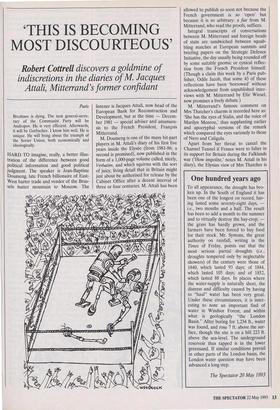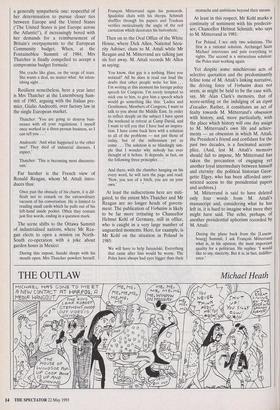`THIS IS BECOMING MOST DISCOURTEOUS'
Robert Cottrell discovers a goldmine of
indiscretions in the diaries of M Jacques Attali, Mitterrand's former confidant
Paris
Brezhnev is dying. The next general-secre- tary of the Communist Party will be Andropov. He is very efficient. Afterwards, it will be Gorbachev. I know him well. He is unique. He will bring about the triumph of the Soviet Union, both economically and ideologically.
HARD TO imagine, really, a better illus- tration of the difference between good political information and good political judgment. The speaker is Jean-Baptiste Doumeng, late French billionaire of East- West barter trade and vendor of the Brus- sels butter mountain to Moscow. The listener is Jacques Attali, now head of the European Bank for Reconstruction and Development, but at the time — Decem- ber 1981 — special adviser and amanuen- sis to the French President, Francois Mitterrand.
M. Doumeng is one of the many bit-part players in M. Attali's diary of his first five years inside the Elysee (from 1981-86; a second is promised), now published in the form of a 1,000-page volume called, nicely, Verbatim, and which squirms with the sort of juicy, living detail that in Britain might just about be authorised for release by the Cabinet Office after a decent interval of three or four centuries. M. Attali has been allowed to publish so soon not because the French government is so 'open' but because it is so arbitrary: a fiat from M. Mitterrand, who read the proofs, suffices.
Integral transcripts of conversations between M. Mitterrand and foreign heads of state are sandwiched between squab- bling matches at European summits and briefing papers on the Strategic Defence Initiative, the day usually being rounded off by some suitably gnomic or cynical reflec- tion from the French President himself. (Though a claim this week by a Paris pub- lisher, Odile Jacob, that some 43 of these reflections have been 'borrowed' without acknowledgement from unpublished inter- views with M. Mitterrand by Elie Wiese!, now promises a lively debate.) M. Mitterrand's famous comment on Mrs Thatcher's charms is recorded here as: `She has the eyes of Stalin, and the voice of Marilyn Monroe,' thus supplanting earlier and apocryphal versions of the remark which compared the eyes variously to those of Nero and Caligula.
Apart from her threat to cancel the Channel Tunnel if France were to falter in its support for Britain during the Falklands war (`How impolite,' notes M. Attali in his diary), the Elysian view of Mrs Thatcher is a generally sympathetic one: respectful of her determination to pursue closer ties between Europe and the United States (`The United States is just Europe across the Atlantic!'), if increasingly bored with her demands for a reimbursement of Britain's overpayments to the European Community budget. When, at the Fontainebleu Summit of 1984, Mrs Thatcher is finally compelled to accept a compromise budget formula:
She cracks like glass, on the verge of tears. She wants a deal, no matter what. An aston- ishing sight .
Resilient nonetheless, here a year later is Mrs Thatcher at the Luxembourg Sum- mit of 1985, arguing with the Italian pre- mier, Giulio Andreotti, over factory law in the single European market.
Thatcher: 'You are going to destroy busi- nesses with all your regulations. I myself once worked in a three-person business, so I can tell you ..
Andreotti: 'And what happened to the other two? They died of industrial diseases, I expect.'
Thatcher: 'This is becoming most discourte- ous.'
Far harsher is the French view of Ronald Reagan, whom M. Attali intro- duces thus:
Once past the obstacle of his charm, it is dif- ficult not to remark on the extraordinary vacuum of his conversation. He is limited to reading small cards which he pulls out of his left-hand inside pocket. Often they contain just five words, ending in a question mark.
The scene shifts to the Ottawa Summit of industrialised nations, where Mr Rea- gan elects to open a session on North- South co-operation with a joke about garden hoses in Mexico:
During this exposé, Suzuki sleeps with his mouth open. Mrs Thatcher powders herself. Francois Mitterrand signs his postcards. Spadolini chats with his sherpa. Schmidt shuffles through his papers and Trudeau verifies meticulously the angle of the red carnation which decorates his buttonhole.
Then on to the Oval Office of the White House, where Dick Allen, National Secu- rity Adviser, chats to M. Attali while Mr Reagan and M. Mitterrand are talking just six feet away. M. Attali records Mr Allen as saying:
You know, that guy is a nothing. Have you noticed? All he does is read out loud the drafts that other people write for him . . . I'm writing at this moment his foreign policy speech for Congress. I'm sorely tempted to stick one to him, to give him a speech which would go something like this: 'Ladies and Gentlemen, Members of Congress, I want to talk to you about the Middle East. In order to reflect deeply on the subject I have spent the weekend in retreat at Camp David, and I want to tell you that I have had an inspira- tion. I have come back here with a solution to all of the problems — not just those of today, but of the millennium yet to come . . The solution is so blindingly sim- ple that I wonder why nobody has ever thought of it before. It depends, in fact, on the following three principles . .
And there, with the chamber hanging on his every word, he will turn the page and read: `Now, you son of a bitch, you are on your own.'
At least the indiscretions here are miti- gated, to the extent Mrs Thatcher and Mr Reagan are no longer heads of govern- ment. The publication of Verbatim is likely to be far more irritating to Chancellor Helmut Kohl of Germany, still in office, who is caught in a very large number of unguarded moments. Here, for example, is Mr Kohl on the situation in Poland in 1985:
We will have to help Jaruzelski. Everything that came after him would be worse. The Poles have always had eyes bigger than their stomachs and ambitions beyond their means.
At least in this respect, Mr Kohl marks a continuity of sentiment with his predeces- sor, Chancellor Helmut Schmidt, who says to M. Mitterrand in 1981:
For Poland, I see only two solutions. The first is a rational solution. Archangel Saint Michael intervenes and puts everything to rights. The second is a miraculous solution: the Poles start working again.
Yet despite some mischievous acts of selective quotation and the predominantly feline tone of M. Attali's linking narrative, the driving force of Verbatim does not seem, as might be held to be the case with, say, Mr Alan Clark's memoirs, that of score-settling or the indulging of an esprit d'escalier. Rather, it constitutes an act of fealty towards M. Mitterrand's obsession with history, and, more particularly, with the place which history will one day assign to M. Mitterrand's own life and achiev- ments — an obsession in which M. Attali, the President's friend and confidant for the past two decades, is a fascinated accom- plice. (And, lest M. Attali's memoirs should fail to impose, Mr Mitterrand has taken the precaution of engaging yet another loyal intermediary between himself and eternity: the political historian Geor- gette Elgey, who has been afforded unre- stricted access to the presidential papers and archives.)
M. Mitterrand is said to have deleted only four words from M. Attali's manuscript and, considering what he has left in, it is hard to imagine what more they might have said. The echo, perhaps, of another presidential aphorism recorded by M. Attali:
During the plane back from the [Luxem- bourg] Summit, I ask Francois Mitterrand what is, in his opinion, the most important quality for a politician. He replies: 'I would like to say, sincerity. But it is, in fact, indiffer- ence.'



















































 Previous page
Previous page